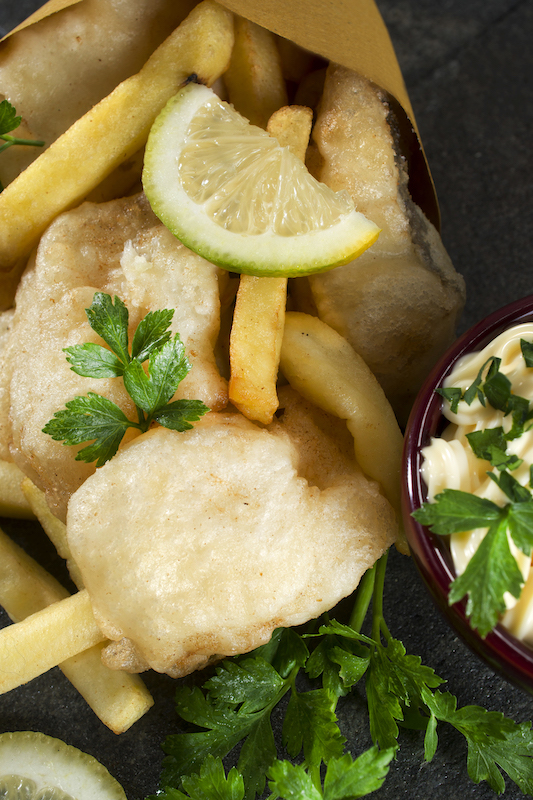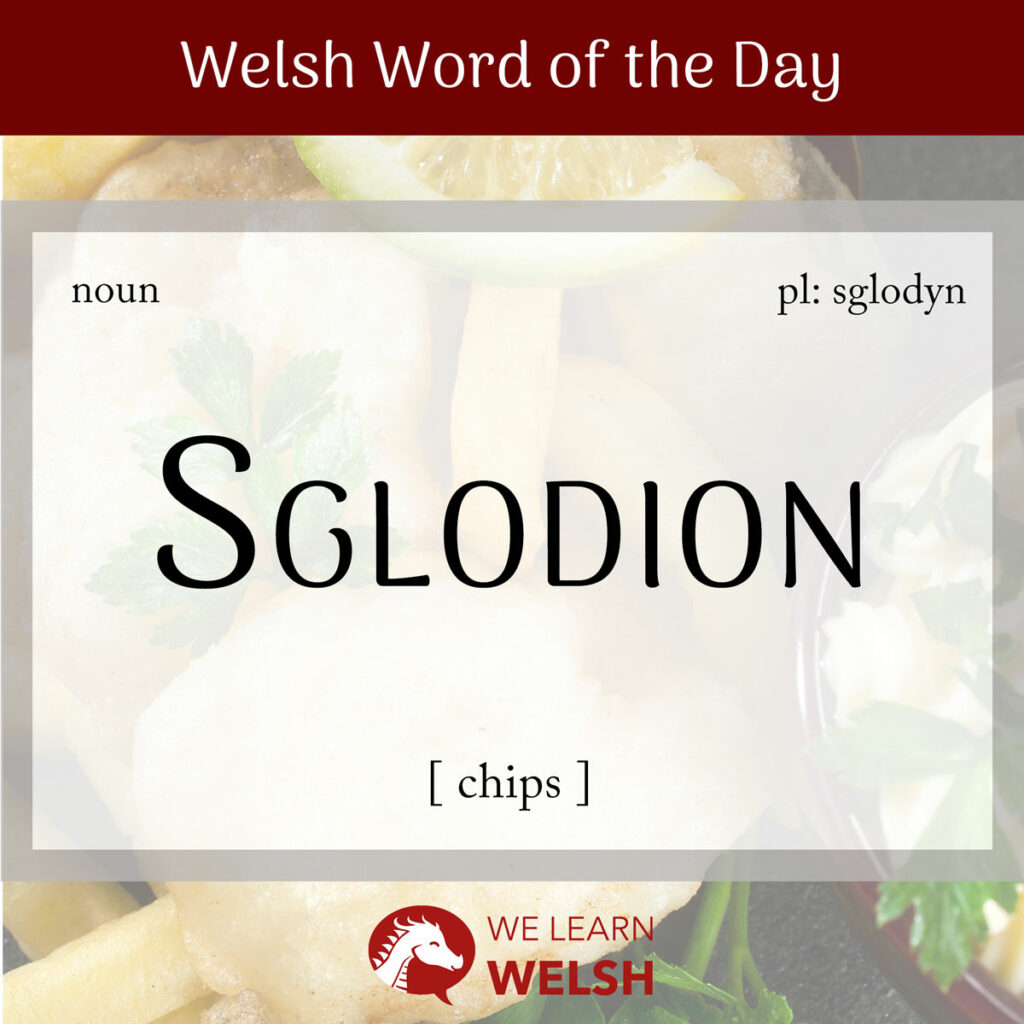Today’s Welsh word of the day is sglodion (chips). Most people know sglodion as the tasty salty treat made of tatws (potatoes).
It can also refer to chips or shavings of wood, or of any material really – though a lot of people instead call these naddion, which comes from the same root as the word naddwr (pencil sharpener). Still, this less culinary meaning is important because it’s actually where the word comes from! Sglodion is the plural of sglodyn (a chip), which in turn was the singulative of an older word spelt asglod or ysglod meaning chips, splinters, or shavings.
Just one sglodyn is a masculine noun, and neither sglodyn nor sglodion are susceptible to any mutations. Though sglodion is by far the most common plural and the more familiar form of the word to most people, you may also hear sglod or sglods for chips.
sglodion
chips
sglodyn
a chip
So we know that sglodion were originally inedible, as in bwrdd sglodion (a chipboard) or even meicrosglodyn (a microchip).
Note, though, that you couldn’t use it to refer to an imperfection in gwydr (glass) or tseina (china); this is called a tolc (dent / chip). It’s also not for gambling chips which are usually just called tsips.
The use of the word to refer to the bwyd (food) is a calque from English. This doesn’t mean that the word has an etymological origin in English – it doesn’t, asglod is a proto-Brittonic word originally derived from the Latin word assula meaning splinter – but that Welsh has borrowed the English pattern of describing deep-fried slices of tatws by their having been ‘chipped off’ said taten (potato).
A quick clarification for those not from the UK: I’m talking about what’s called fries or French fries in the US, Canada, and many other countries. What’s called potato chips in a lot of places is crisps in British English and creision in Welsh.
It’s hard to believe tatws (potatoes) aren’t a native crop to the UK, given how beloved they are here. In fact, sglodion only graced British ryseitiau in the early nineteenth century and weren’t sold commercially for another fifty years after that.
Apparently, the first siopau sglodion (chip shops) in Wales were called tafarnau tatws (potato pubs) – some places still use this as a name to this day – and even the concise nickname sglodfa (chipplace / chippy) has been recorded in Geiriadur yr Academi (The Welsh Academy Dictionary).
I’d unfortunately have to recommend sticking to siop sglodion (chip shop), though – or the more casual siop jips (chip shop) – just to ensure you’re understood by everyone!
Dydy hi ddim yn lico sglodion, ond mae hi’n hoff iawn o datws pob.
She doesn’t like chips, but she does really like baked potatoes.

Today, pysgod a sglodion (fish and chips) is one of Brits’ national dishes, sometimes rendered ‘sgod a sglod or more specifically cod a sglod (cod and chips).
And siopau sglodion are a staple in most Welsh trefau (towns). This is especially the case ar lan y môr (at the seaside), which is the central point around which a lot of our economy circulates, given the importance of sectors like twristiaeth (tourism) and pysgota (fishing).
So these days you’ll be hard pressed to meet a Welsh (or really any British) person who isn’t obsessed with sglodion. And if it’s not sglodion, it’ll be at least one of tatws pob (baked potatoes), tatws rhost (roast potatoes) or my personal favourite tatws stwnsh (mashed potatoes) – we really are obsessed with the humble taten (potato) here in the UK!
Plus sglodion themselves can be jazzed up in a million and one ways – beyond just adding halen (salt) and finegr (vinegar), of course.
- sglodion caws / sglodion a chaws = cheesy chips
- sglodion cyri = curry and chips
- sglodion tew = thick-cut chips
- sglodion tenau = thin-cut chips / fries
- sglodion cyrliog = curly fries
- sglodion tatws melys = sweet potato fries
- crwyn tatws = potato skins
- brechdan sglodion / brechdan jips = a chip butty
That’s even before you get into the debate over whether to pair them with ffa pob (baked beans) or pys stwnsh (mushy peas).
Ma’ chwant ‘da fi am y sglodion ‘na o’r siop ger yr orsaf.
I’ve got a real craving for those chips from the shop by the station.
You may have noticed me using the words jips a couple of times. This is obviously a loan word from English, though it’s actually a little bit more complicated than that – jips is a mutation of tsips / tships.
Since there is no sound in Welsh like the English ch, words beginning with ch that are borrowed into Welsh from English are altered in a variety of ways. Sometimes the ch will be replaced with a si (this is the Welsh spelling of the sound that in English is written sh), or sometimes we’ll attempt to replicate the ch with the spelling ts, tsi, or tsh.
So chips in Welsh became tsips / tships, and a lot of people used this word instead of sglodion, particularly if they were used to using sglodion just for shavings of wood or material rather than for the foodstuff.
Normally loan words in Welsh don’t mutate – you’d have thought we’d leave it at that! But in actuality, many Welsh speakers have begun applying a soft mutation to loan words that start with ts / tsh, changing the first letter to a j. Which is itself a bit of a ‘loan letter’ in Welsh! This is a recent phenomenon that seems to have developed completely authentically.
So in cases where you’d apply a soft mutation, like after mae gen i (I have) or dy (your), you can replace tsips with jips just as you’d replace any other word with its mutated version.
The mutated form occurs after siop (shop) and brechdan (sandwich), since they’re feminine nouns.
Nes i fwyta rhai o’i jips o pan nad oedd o’n edrych!
I ate some of his chips when he wasn’t looking!
You don’t necessarily have to use the ts -> j mutation; not everyone does. Since it’s relatively new, it’s not necessarily considered mandated as a grammatical rule and some strict grammar purists may even consider it ‘incorrect’.
But I absolutely love this phenomenon, for two reasons. Firstly, it’s a demonstration that mutations are a really natural part of Welsh, which continue to evolve along with the language itself, and which native speakers use as a tool of flowing and idiomatic speech, rather than the imposed grammar tyranny they’re often presented as.
And secondly, it shows that even when Welsh adopts words from other languages and cultures, that doesn’t mean it has to lose what makes it unique. Quite the opposite – speakers naturally find ways to integrate these new additions and put our own linguistic spin on them, so that the Welsh language continues to evolve along with the Welsh nation.

